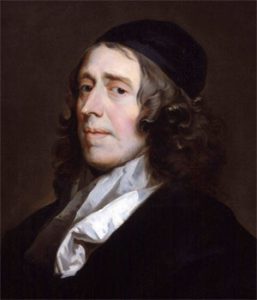Who was John Owen?

I will not here attempt to repeat that which has been written by others about Dr. John Owen, as I have nothing to add (although I did copy some material from the 1861 edition of The New American Cyclopaedia as it contains information I had not seen elsewhere). I will simply give a quick overview of his life, ministry, and works. For the interested reader I will add links to various sources of information about Dr. Owen which go into more depth, or at least, as much depth as the paucity of information about Dr. Owen’s personal life will allow.
John Owen was born in 1616 within the county of Oxfordshire, England. He died in 1683 in Ealing, West London, England. In his 67 years upon this earth, Dr. Owen and his wife (sadly, of whom even less is known than of Owen himself) had 11 children (all of whom died prior to his own passing), served as the Dean of Christ Church, served as vice-chancellor of Oxford University, was chaplain to Oliver Cromwell (accompanying him on sundry expeditions), and wrote 27 volumes worth of some of the most penetrating and insightful prose on the Christian faith ever written. He is considered by many to be the ‘Prince of Puritans,’ eclipsing even such luminaries as Jonathan Edwards in their estimation.
What struck me the most about Dr. Owen was not his intellectual acumen and command of God’s Word. Nor was it his incredible discipline which allowed for only four hours of sleep per night so that his prodigious work could continue unabated. It was the fact that a man could endure such suffering as he did through the loss of every single one of his children, through the loss of power and position repeatedly throughout his life due to the political and religious turmoil within England, and not only not collapse in bitterness and defeat, but apparently to grow in magnanimity, grace, and love for the lost as to be able to write a letter such as what follows to a lady by the name of ‘Hartopp’ who had just suffered the loss of a child:
Dear Madam,
— Every work of God is good; the Holy One in the midst of us will do no iniquity; and all things shall work together for good unto them that love him, even those things which at present are not joyous, but grievous; only his time is to be waited for, and his way submitted unto, that we seem not to be displeased in our hearts that he is Lord over us. Your dear infant is in the eternal enjoyment of the fruits of all our prayers; for the covenant of God is ordered in all things, and sure. We shall go to her; she shall not return to us. Happy she was in this above us, that she had so speedy an issue of sin and misery, being born only to exercise your faith and patience, and to glorify God’s grace in her eternal blessedness. My trouble would be great on the account of my absence at this time from you both, but that this also is the Lord’s doing; and I know my own uselessness wherever I am. But this I will beg of God for you both that you may not faint in this day of trial, — that you may have a clear view of those spiritual and temporal mercies wherewith you are yet intrusted (all undeserved), — that sorrow of the world may not so overtake your hearts as to disenable to any duties, to grieve the Spirit, to prejudice your lives; for it tends to death. God in Christ will be better to you than ten children, and will so preserve your remnant, and to add to them, as shall be for his glory and your comfort.
Only consider that sorrow in this case is no duty, it is an effect of sin, whose cure by grace we should endeavour. Shall I say, Be cheerful? I know I may. God help you to honour grace and mercy in a compliance therewith. My heart is with you, my prayers shall be for you; and I would have seen you this day could I have borrowed a coach, and I am, dear madam, your most affectionate friend and unworthy pastor,
I think it is worth noting that John Owen states God in Christ will be better to you than ten children, because as I mentioned above, he and his wife experienced the loss of all eleven children with which they were blessed. All but one of these children perished at a young age (the names and dates of birth/death for any of these are unknown as of this writing), and the one that did survive childhood died in her early twenties. It may very well be that when John Owen mentions ten children, his lone surviving child was yet living. In any case, in my mind it is a letter which reveals much about the character of John Owen.